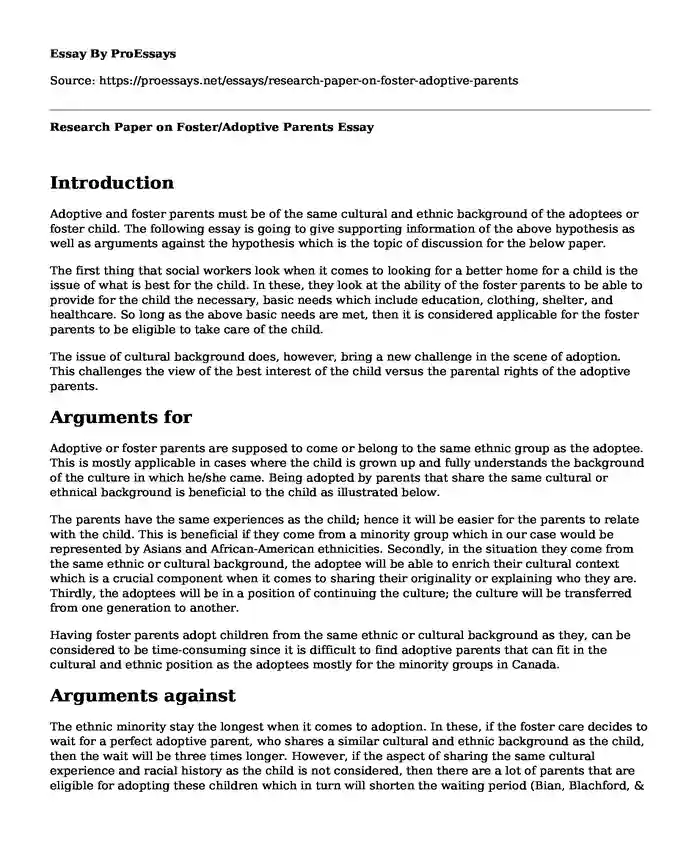Introduction
Adoptive and foster parents must be of the same cultural and ethnic background of the adoptees or foster child. The following essay is going to give supporting information of the above hypothesis as well as arguments against the hypothesis which is the topic of discussion for the below paper.
The first thing that social workers look when it comes to looking for a better home for a child is the issue of what is best for the child. In these, they look at the ability of the foster parents to be able to provide for the child the necessary, basic needs which include education, clothing, shelter, and healthcare. So long as the above basic needs are met, then it is considered applicable for the foster parents to be eligible to take care of the child.
The issue of cultural background does, however, bring a new challenge in the scene of adoption. This challenges the view of the best interest of the child versus the parental rights of the adoptive parents.
Arguments for
Adoptive or foster parents are supposed to come or belong to the same ethnic group as the adoptee. This is mostly applicable in cases where the child is grown up and fully understands the background of the culture in which he/she came. Being adopted by parents that share the same cultural or ethnical background is beneficial to the child as illustrated below.
The parents have the same experiences as the child; hence it will be easier for the parents to relate with the child. This is beneficial if they come from a minority group which in our case would be represented by Asians and African-American ethnicities. Secondly, in the situation they come from the same ethnic or cultural background, the adoptee will be able to enrich their cultural context which is a crucial component when it comes to sharing their originality or explaining who they are. Thirdly, the adoptees will be in a position of continuing the culture; the culture will be transferred from one generation to another.
Having foster parents adopt children from the same ethnic or cultural background as they, can be considered to be time-consuming since it is difficult to find adoptive parents that can fit in the cultural and ethnic position as the adoptees mostly for the minority groups in Canada.
Arguments against
The ethnic minority stay the longest when it comes to adoption. In these, if the foster care decides to wait for a perfect adoptive parent, who shares a similar cultural and ethnic background as the child, then the wait will be three times longer. However, if the aspect of sharing the same cultural experience and racial history as the child is not considered, then there are a lot of parents that are eligible for adopting these children which in turn will shorten the waiting period (Bian, Blachford, & Durst, 2015).
In the current generation, people have traveled from all over the world, and there has been mixed ethnical marriages, many cases of different ethnical adoptions, thus making different ethnical adoptions a possibility which has been practiced and is a success in many foster homes. Secondly, people are slowly putting back the issue surrounding the ethnic differences and are adjoining forces where they have the slogan people are all equal and the same despite their skin color and religion. Nowadays people from different ethnic backgrounds can relate through speaking the same language, and practicing the same education.
Conclusion
In conclusion, so long as the adoptive parents are in a position of bringing up the adoptees in a right way and are in a position of providing the basic needs, the issue of ethnicity and cultural background should not be a hindrance when it comes to adoption. The best interests of the child are to be put first.
References
Sinclair, R. (2016). The Indigenous child removal system in Canada: An examination of legal decision-making and racial bias. First Peoples Child & Family Review, 11(2), 8-18.
Bian, F., Blachford, D., & Durst, D. (2015). The Color Purple?: Perspectives of Canadian Parents of Adopted Children from China. Journal of Comparative Social Work, 10(2).
Cite this page
Research Paper on Foster/Adoptive Parents. (2022, Nov 28). Retrieved from https://proessays.net/essays/research-paper-on-foster-adoptive-parents
If you are the original author of this essay and no longer wish to have it published on the ProEssays website, please click below to request its removal:
- Course Work Example: Communication in the Workplace
- Societal Standards for Beauty in Toni Morrison's The Bluest Eyes Essay
- Essay Sample on the 1920s Flappers
- Essay on Confronting Toxic Behaviour: Overcome Fear, Strengthen Relationships.
- Essay Sample on Paul's Teaching on Marriage & Immorality in the Pastoral Epistles
- Paper Sample on Gaining Economic Empowerment: Benefits & Impact on Community
- The Impact of Social Media on Families: 72% of Smartphone Holders Connect Online







